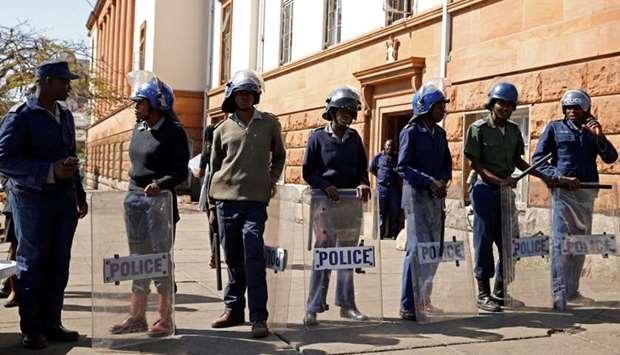Hundreds of police backed by soldiers and army helicopters deployed in Zimbabwe's second city on Monday, in a show of force that stopped the main opposition party from launching an anti-government protest movement for the second time in four days.
The street march in Bulawayo was called by the Movement for Democratic Change's (MDC) as it looks to rally support nationwide against President Emmerson Mnangagwa's government, which it accuses of repression and blames for the country's worst economic crisis in a decade.The government banned the event on Sunday. On Monday a magistrate adjourned the party's appeal against that decision until 4 p.m. (1400 GMT), when the demonstration had been due to end.
Authorities had clamped down on a similar gathering in Harare on Friday, which the MDC called off after police there rounded up its followers and dispersed them with batons and water cannon and tear gas, prompting many shops and businesses to close.
On Monday there were no witness reports of violence in Bulawayo, an MDC heartland, and activity in the city appeared much as normal.
However, large contingents of police patrolled on foot, horseback and in vehicles, setting up checkpoints on roads leading into the city as they searched cars and people for weapons, and cordoning off the MDC offices and the magistrates court.
"The law (used to ban the protest) is clearly unconstitutional and unjust but we have an obligation to comply because we are a peaceful organisation," David Coltart, Bulawayo lawyer and MDC senator, told Reuters before the adjournment.
Eight MDC officials, including its national chairwoman, were also due to appear in the court on charges of publishing falsehoods, the party said. They were arrested on Saturday as they distributed pamphlets urging residents to attend Monday's march.
In January, Bulawayo was the site of massive looting and destruction of property as protests against a steep rise in the price of fuel turned violent, triggering an army crackdown that killed more than a dozen people.
Those deaths compromised a pledge by Mnangagwa to put an end to the repressive political climate that characterised much of his predecessor Robert Mugabe's 37 years in power.
The protest campaign, which the MDC intends to take to two other cities on Tuesday and Wednesday, is again casting a spotlight on that promise, a year after Mnangagwa was elected in a vote the party alleges was rigged.
The 76-year-old Mnangagwa is also struggling to convince the growing ranks of the poor that austerity measures and other reforms can trigger an economic recovery, as anger mounts over triple-digit inflation, rolling power cuts and shortages of U.S. dollars, fuel and bread.
The crisis has brought back memories of the hyperinflation of a decade ago that forced Zimbabwe to ditch its currency.
The president, a Mugabe aide over more than four decades, says Zimbabwe's economic problems stem from sanctions imposed by the West against his predecessor's rule nearly two decades ago, worsened by a severe drought that has halved the maize harvest.
On Sunday, the regional Southern African Development Community (SADC) group meeting in Tanzania said the sanctions should be lifted immediately "to facilitate socio-economic recovery."

